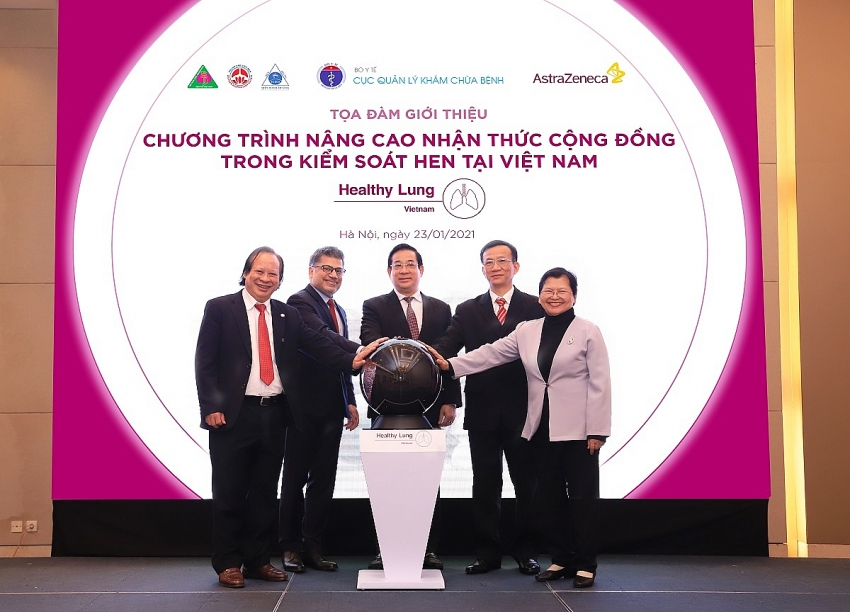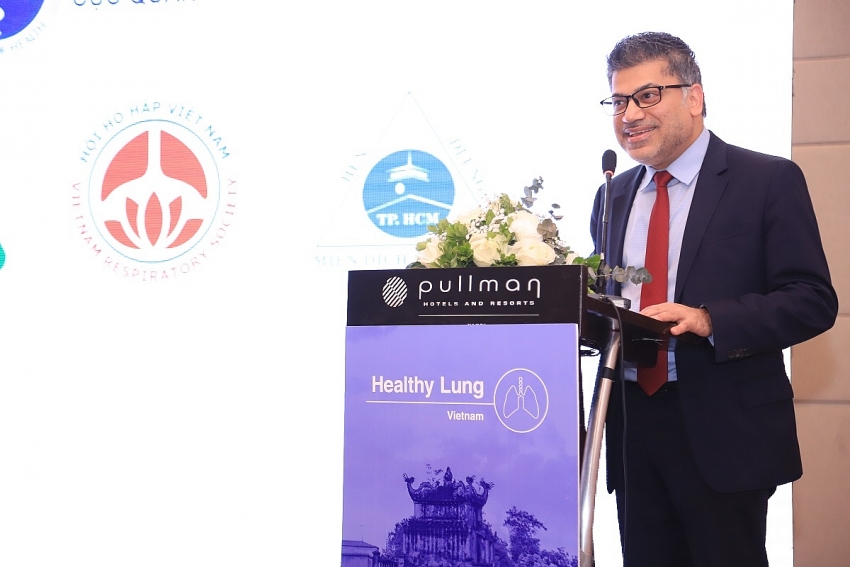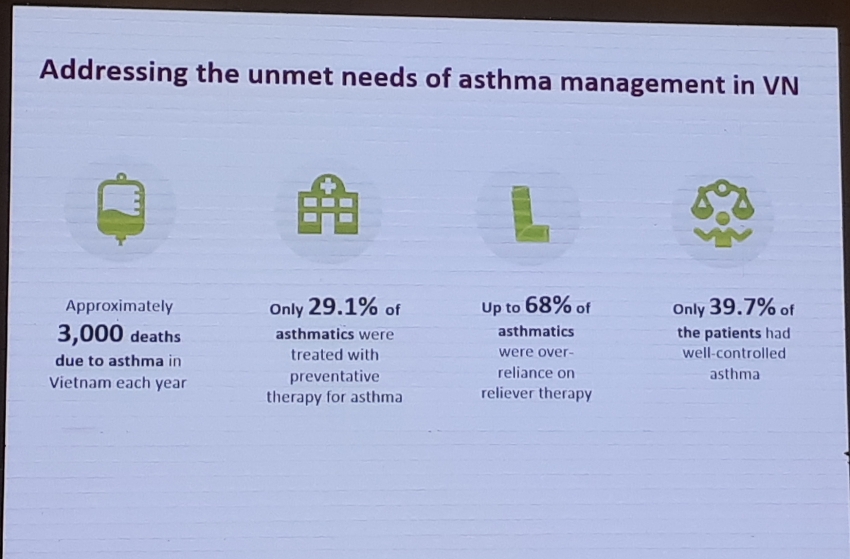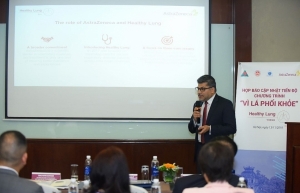New campaign launched to improve awareness for asthma management in Vietnam
 |
| The launch of the communication campaign titled “Do you control asthma or does asthma control you” |
The campaign aims to help patients quickly assess their levels of SABA (short-acting beta2-agonist) reliance with six questions on the programme website and Facebook fanpage. These platforms will be updated with the latest treatment guidelines for patients to actively control their conditions and encourage active consultations with health professionals about how to best control asthma.
The over-reliance on SABA reliever therapy is among the key obstacles in asthma treatment in Vietnam. Asthma patients frequently over-rely on SABA reliever therapy to treat the symptoms of asthma, without knowing that it can mask the worsening of symptoms. The link between SABA overuse and an increased risk of asthma attacks has recently led to updated recommendations from the Global Initiative for Asthma (GINA) that seek to avoid establishing a pattern of reliance on SABA early in the disease.
GINA no longer recommends SABA alone as the preferred reliever therapy and instead recommends the use of low dose inhaled corticosteroid (ICS)-formoterol therapy as-needed as the preferred reliever therapy across all asthma severities. These updated global recommendations represent a significant change in asthma management over the past 30 years.
According to the latest treatment guidelines from the Ministry of Health (MoH), reliever medications alone should not be used in asthma treatment as they can increase the risk of patients having an exacerbation or even fatality risk.
Addressing the event, Assoc. Prof. Luong Ngoc Khue, director of Medical Service Administration (MSA), said that, “Ensuring quality asthma care is one of the government’s healthcare priorities, as stated in the national strategy for non-communicable diseases prevention 2015-2025 by the prime minister.”
In 2020, the MoH issued national guidelines on the diagnosis and treatment of asthma for adults and children over 12 years which warns that the frequent or excessive use of reliever medication can poise the risk of hospitalisation and fatality, and asthma treatment in Vietnam is gradually following this guideline. The progress of improving asthma care will require contributions from regulators, healthcare professionals (HCPs), and the whole community. Through the communication campaign on the Healthy Lung website and fanpage, programme organisations are calling for the participation of all parties in the management and control of asthma.
The SABINA pharmacy programme’s preliminary data from 14 provinces and cities in Vietnam shows that up to 68 per cent of asthma patients bought three or more reliever medications in 2020. According to GINA 2019, the use of three reliever pills a year will double the risk of hospitalisation. Overuse of SABA has been associated with adverse outcomes such as increased airway overreaction, decreased bronchodilator response, which may lead to an increased risk of emergency admission and possibly increased fatality risks. For that reason, patients and the community need to actively update on how to manage asthma properly in mainstream media.
 |
| Nitin Kapoor, chairman cum general director, AstraZeneca Vietnam |
Nitin Kapoor, chairman cum general director of AstraZeneca Vietnam shared: “AstraZeneca aims to play a leading role in reducing the prevalence of non-communicable diseases (NCDs), especially respiratory diseases by working together with healthcare partners. We are committed to enhancing these partnerships to improve awareness and quality of asthma care, to eliminate preventable asthma attacks, and ultimately improve patients’ lives.”
Sending the question to the public “Do you control asthma, or asthma controls you?”, the awareness campaign is taking place in parallel with continued medical education throughout 2020 for healthcare professionals. These activities are part of the Healthy Lung programme, a partnership between AstraZeneca, national governments, and specialised associations in nine Asian countries including Vietnam to raise the profile of respiratory diseases and build the capability of healthcare systems in these countries to manage these diseases.
In 2017, Vietnam was among the first countries to kick-off the programme in partnership with the MSA, the Ministry of Health, and three specialised associations. Building on the success of the first phase of the Healthy Lung programme to improve the quality of outpatient management of asthma and chronic obstructive pulmonary disease (COPD) in Vietnam, the extended programme will continue to enhance the quality of care for the mentioned respiratory diseases while expanding into a new area – lung cancer, with two information hubs: a website and a Facebook fanpage.
According to Assoc. Prof. Nguyen Viet Nhung, president of the Vietnam Lung Association, the latest asthma treatment guidelines highlighted the importance of addressing the SABA reliever overuse, and adhere to maintenance therapy as it is a sustainable solution not only for the healthcare sector but also reduces the cost burden while helping patients avoid unfortunate consequences. The role of grassroots healthcare teams is very important in delivering this mission.
 |
| Key statistics on asthma management in Vietnam |
Prof. Dr. Ngo Quy Chau, president of the Vietnam Respiratory Association shared: “This initiative is a milestone in the spreading of asthma treatment knowledge beyond HCPs to patients and the wider community. I believe this is a practical and effective programme to help improve the quality of asthma care in Vietnam.”
Assoc. Prof. Le Thi Tuyet Lan, president of the Ho Chi Minh Association of Asthma, Allergy & Clinical Immunology, also stressed: “In my observations, many patients feel ‘attached’ to their SABA inhaler, mistakenly believing this to be the best way to control their symptoms. They are often unaware that using their SABA inhaler just three or more times a week is a sign of poor asthma control and increases their risk of an asthma attack. We hope asthma patients will realise that SABA over-reliance will increase the risk of exacerbation and terrible consequences that are preventable."
What the stars mean:
★ Poor ★ ★ Promising ★★★ Good ★★★★ Very good ★★★★★ Exceptional
Themes: Healthcare Platform
- Hanoi intensifies airport monitoring amid Nipah disease risks
- Cosmetics rules set for overhaul under draft decree
- Policy obstacles being addressed in drug licensing and renewal
- Sanofi, Long Chau Pharmacy relaunch medicine blister pack collection initiative
- Takeda Vietnam awarded for ongoing support of Vietnam’s sustainability efforts
Related Contents
Latest News
More News
- Hanoi intensifies airport monitoring amid Nipah disease risks (January 29, 2026 | 15:21)
- Congratulations from VFF Central Committee's int’l partners to 14th National Party Congress (January 25, 2026 | 09:46)
- List of newly-elected members of 14th Political Bureau announced (January 23, 2026 | 16:27)
- 14th Party Central Committee unanimously elects To Lam as General Secretary (January 23, 2026 | 16:22)
- List of members of 14th Party Central Committee announced (January 23, 2026 | 09:12)
- Highlights of fourth working day of 14th National Party Congress (January 23, 2026 | 09:06)
- Press provides timely, accurate coverage of 14th National Party Congress (January 22, 2026 | 09:49)
- Press release on second working day of 14th National Party Congress (January 22, 2026 | 09:19)
- Minister sets out key directions to promote intrinsic strength of Vietnamese culture (January 22, 2026 | 09:16)
- 14th National Party Congress: Renewed momentum for OVs to contribute to homeland (January 21, 2026 | 09:49)





 Tag:
Tag:
























 Mobile Version
Mobile Version